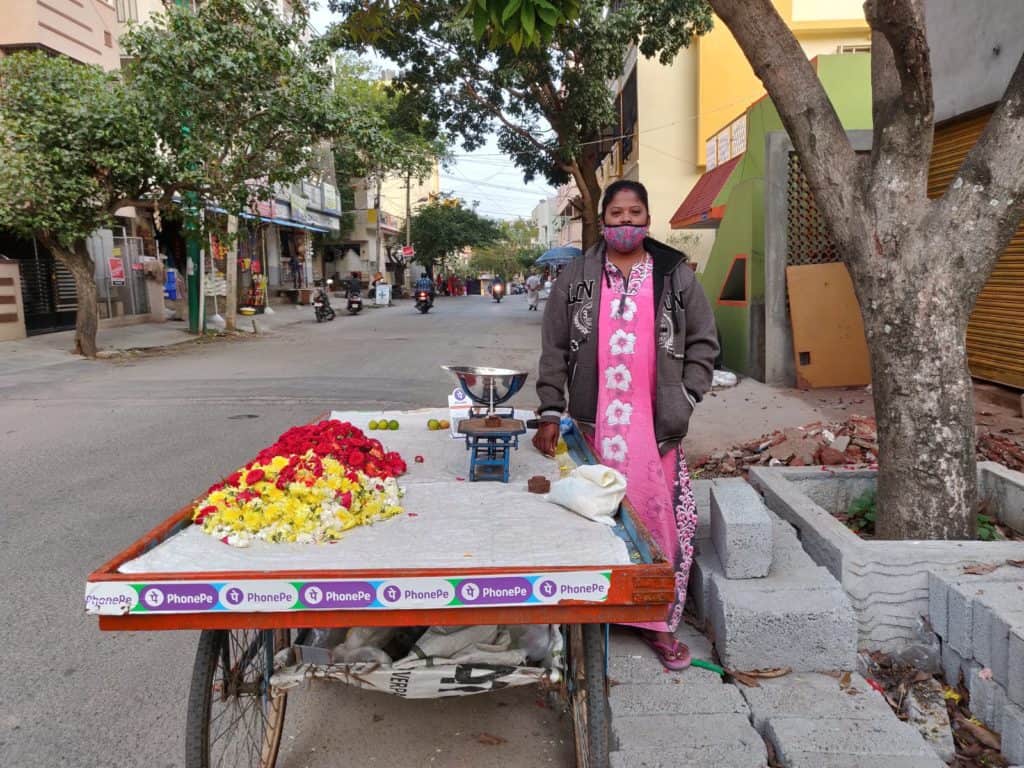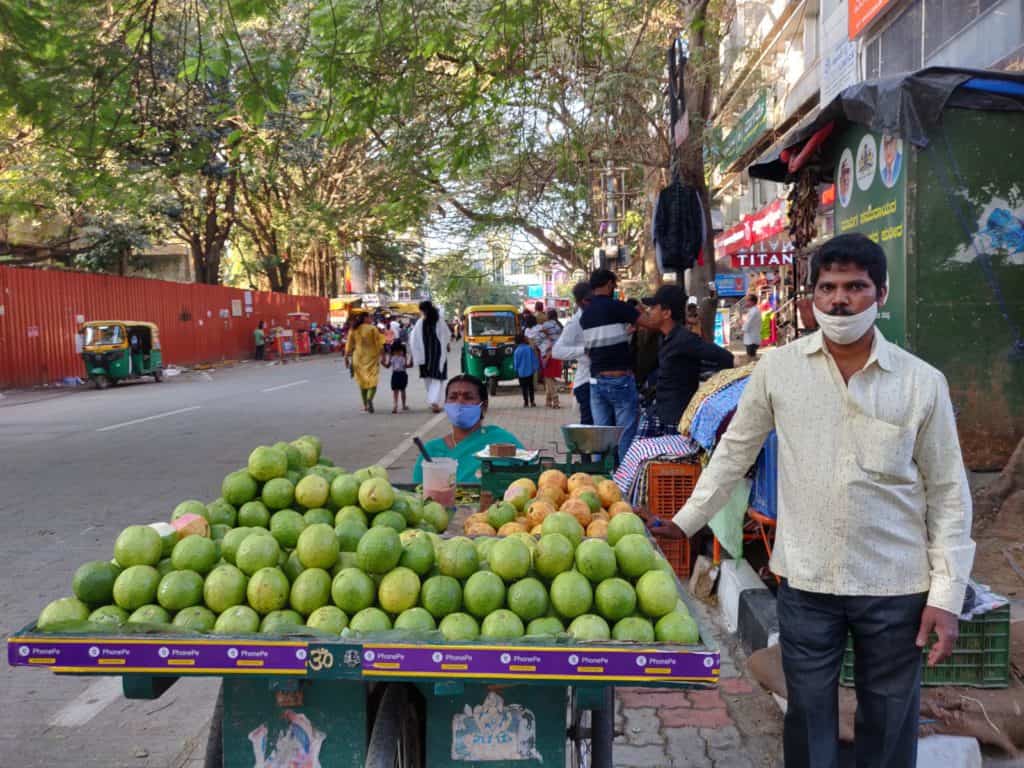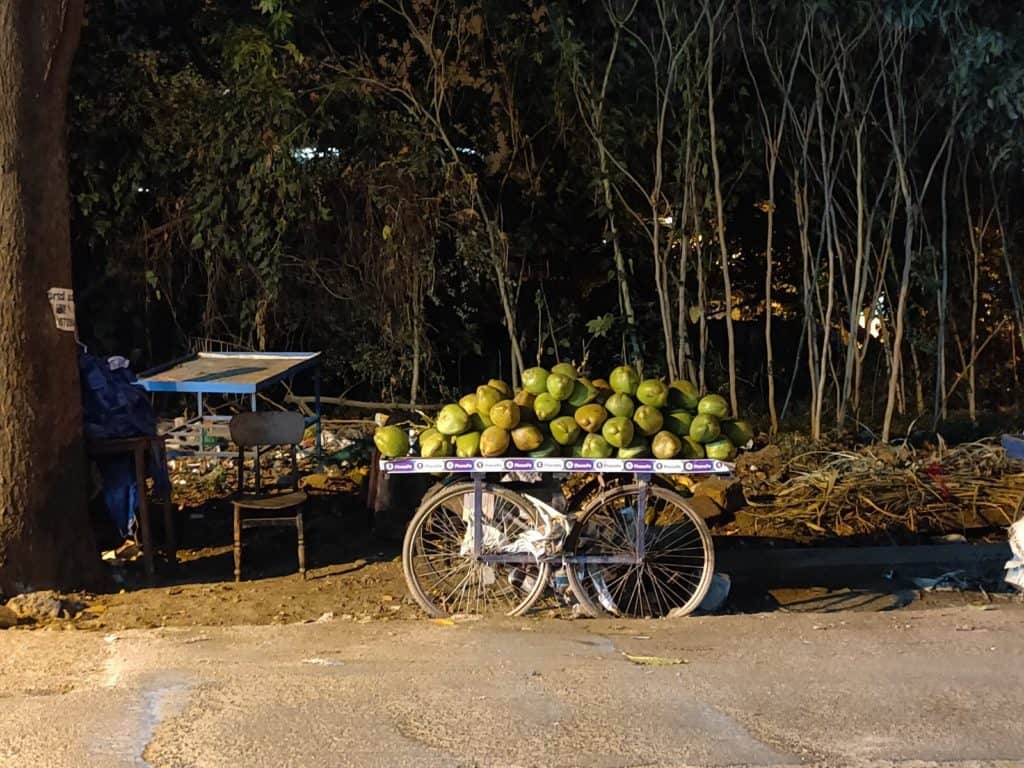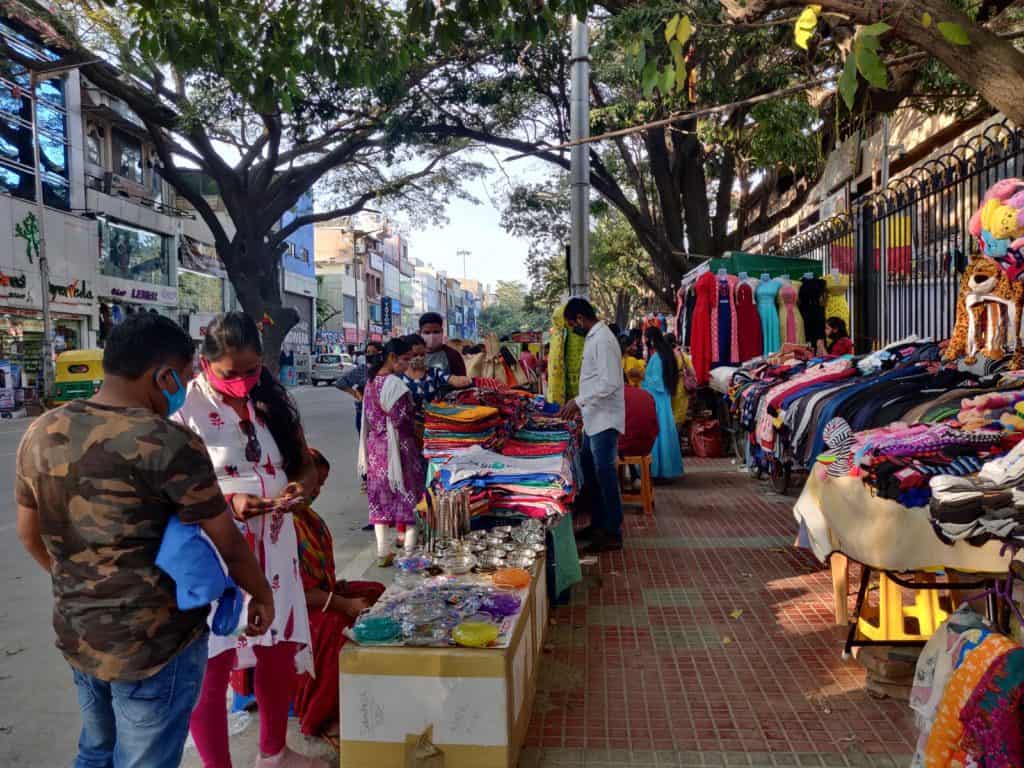
Sudha V, hawks on one of the arterial roads of Uttarahalli, warding off cows that tend to steer too close to her cart of flowers. While she witnessed a surge in customers on the day of Makara Sankranti, the next day was a different story. There are few takers for her once-fresh red roses. What’s more, she faces stiff competition from three other flower vendors hawking along the same stretch.
As the pandemic claimed jobs, many moved to the informal sector because of its labour-intensive nature, reliance on basic resources and relative ease of entry. Street vending, particularly, visibly increased in the city.
A domestic worker, Sudha took up street vending after the lockdown cost her job at more than half the households she was working for. “I have three children and my husband does not help with income and my landlord had threatened to evict us” says Sudha.
She lost a few more households after she became a part-time street vendor. Home owners were apprehensive about her coming in contact with customers. When Sudha’s mother passed away, she took leave for 10 days to perform the last rites. One household fired her for it.
Recognised by law
The Street Vendors (Protection of Livelihood and Regulation of Street Vending) Act of 2014 regulates street vendors in public areas and protects their rights to operate. The Act mandates the constitution of a Town Vending Committee (TVC) in every Urban Local Body across the country.
A study by the Center for Civil Society, however, found that only 1/3rd of India’s 7,263 urban bodies have TVCs, 42% of which do not have sufficient street vendor representation, a clear violation of the Act. Additionally, fewer of them have grievance redressal committees.
Although it has been six years since the Act was passed, in Bengaluru, the TVCs were formed only a year ago. Of the city’s eight zones, seven have TVCs. Bommanahalli is the exception.
Read more: Why cities must strive for equality to fight COVID-19 effectively
While the Act was enacted centrally, it was up to the States to frame the rules regarding TVCs.
Babu S, president of the Bengaluru Jilla Beedhi Vyaapari Sanghatanegala Okkuta (Federation of Street Vendors Union in Bengaluru District) says meetings held by TVCs across zones are not uniform in terms of when and how they are held.
Amanullah K, a member of south zone TVC, says that while it has been a year since TVCs were formed, Bruhat Bengaluru Mahanagara Palike (BBMP) has still not given them offices.
The last meeting held by the south zone committee was in November last year, and the next one supposed to be within two weeks. The committee is also tasked with surveying vendors in the city, and issuing vending certificates and ID Cards.
The last survey was carried out in 2017, after which 18000-19,000 vendors were issued documents. “As the lockdown created an rise in street vendors, they need to be identified and given proper identification and certification,” says Amanullah. This, apparently, was to be taken up in the next meeting.
A functional TVC would also help street vendors register for State and Centrally-sponsored social protection schemes, offering them some semblance of financial security, he said.

Arbitrary eviction
While the Act itself is progressive in letter and spirit, the same cannot be said about its implementation.
Take the case of 62-year-old Gowramma who has been selling fruits in Vijayanagar for the last 30 years. The day before Sankranti, the police asked all vendors to move their carts from the road. When they asked Gowramma to move hers, she said that customers will not notice her cart in her new position.
Following a disagreement, a cop confiscated her weights and scale and refused to return it even after Gowramma and her daughter-in-law pleaded with them. “I told him I have been in the same spot for three decades now,” said Gowramma.
Those around her also informed the policeman of Gowramma’s bad leg. They requested that he return the weights as the festival was on the following day. The policeman, apparently, did not budge. She continued her business on borrowed scales and weights. Her family made several trips to the police station, but they could not retrieve the weights and scales.
Read more: Bengaluru’s street vendors: A vibrant community deprived of rights
Gowramma has a valid vending license and certificate, and says that she has never faced such an altercation since she started hawking. In pre-pandemic times, she would turnover around Rs.3,000-4,000 a day, but her income dwindled due to the pandemic. She said that relocating would mean losing her old customers.

Babu says if the police receive complaints from the public regarding street vendors, they first have to present the same in front of the TVC, and the Committee will take the necessary action. “Under no circumstances are the police or allied parastatal officials allowed to take independent action against the vendors such as evicting them or confiscating their belongings” says Babu.
Vinay Sreenivasa, lawyer and member of the Federation says that eviction drives are often prompted either by richer residents, Resident Welfare Associations or bigger corporations. He concurs with Babu that all instances of eviction have to be brought before the TVC.
Administrative ignorance
Despite being legalised under the Street Vendors (Protection of Livelihood and Regulating Street Vending) Act in 2014, officials continue to disregard the rights of street vendors.
Vinay blames the BBMP for this. “Six years later, police and government officials are unaware of the Act,” says he, adding, “They still consider street vending to be illegal”.
There is also a class hierarchy that is evident in the kind of treatment meted out to these vendors, he notes. One of the provisions of the Act is to train officials and local authorities. “We have been pushing for this, but to no avail,” says Vinay.
Educating street vendors of their rights is also necessary, he says. “The BBMP should also provide them with basic facilities like toilets, safe drinking water, godowns and shelter against harsh weather conditions” Vinay argues.
Babu also holds that arbitrary evictions and harassment of vendors is because of officials’ ignorance of the Act.
Permanent zones will offer adequate job security for street vendors and instil confidence. “Our aim is to earn a livelihood from vending without troubling the general public, and the government should help us do this” says Babu.

Talking about the necessity of separate vending zones in the city, Amanullah says while the BBMP has chaired innumerable meetings on this, they have not made an active effort to create such zones in any ward. Babu says he made recommendations for these zones in a few select wards, but the BBMP is yet to discuss the proposed areas and invite objections from different government agencies.
Read more: Resettled vendors rue lack of business and facilities in Chandigarh’s new vending zones
According to Shriya Anand, Academics and Research lead at Indian Institute of Human Settlements, the absence of a city-level framework to govern street vending creates a hostile working environment for vendors. “It becomes a constant struggle to assert their rights to work,” says Shriya. It also means that the vendors are at the mercy of police and local authorities.
Shunned in urban planning
Despite hawking guaranteeing livelihood opportunities for the poor and marginalised, it is barely recognised in urban planning. In addition to being a way out of urban poverty, street vending also offers essential services to the urban poor and middle class residents at cheaper rates.

“Street vendors continue to be in a limbo. They do not have the institutional status at a city level to speak up for themselves,” points out Shriya. Despite residents across income groups relying on street vendors for acquiring food on a regular basis, they are not seen as contributors to the urban economy or viewed as an integral part of the core infrastructure of the city. They are imagined as occupants of the public space, she says.
The antagonism towards street vending is also partly due to the vision of a global city and the aesthetics associated with it, Shriya notes. “They have to be prioritised while devising master plans for the city. When the government has power to deem certain areas as no-vending zones, then why not the opposite?” she asks.
Says Sneha Visakha, research fellow at Vidhi Centre for Legal Policy: “Urban policies have to be intuitive to the local context. Street vendors must be regarded as claimants rather than as intruders”
Also read: